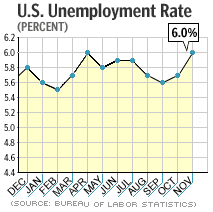NEW YORK (CNN/Money) - Thursday's U.S. government report that weekly claims for unemployment benefits were still at a high level shined a spotlight on a lousy job market -
one that might not get better any time soon, according to some economists.
Though President Bush and Congress likely will pass an economic stimulus package early next year designed, in part, to help stimulate job growth, there's division among economists about how much good such a package will do.
Some 433,000 people filed first-time claims for unemployment benefits last week, the Labor Department reported, a level well above the benchmark 400,000 level that many economists say is a flashing dashboard indicator that the labor market needs repair.

"This is in keeping with the labor market I've grown familiar with -- it's not a fast-growing labor market right now, and we are anticipating upticks in unemployment," said Jeff Wenger, labor economist at the Economic Policy Institute.
Though the Labor Department said last week's claims figures were probably inflated by quirks in the way they adjust data for seasonal factors, there are plenty of other signs that the labor market really is dead in the water:
- The national unemployment rate is at 6 percent -- relatively low, when compared with other recessions, but still at an eight-year high;
- More than 8 million Americans are unemployed;
- About 3.5 million have been drawing unemployment benefits for more than a week;
- About one million will see their benefits expire before the end of the year; and
- Employers, after cutting about 1.8 million jobs during a recession that began in March 2001, started a meager hiring campaign in the summer but returned to trimming payrolls in the fall.
"October and November were the second- and third-heaviest months of the year for layoffs," said John Challenger, CEO of Chicago outplacement firm Challenger Gray & Christmas, which releases closely watched monthly reports on corporate layoff announcements. "We returned to the levels of job cutting we saw in 2001, which was the heaviest year we've ever tracked."
And many economists doubt the hiring picture will improve until at least the second half of the year, if not later.
Businesses are nervous about the economy, nervous about falling stock prices and nervous about the prospect of war in Iraq. They've got too much production equipment sitting around doing nothing -- producers used just 75.6 percent of their capacity in November, the Federal Reserve said recently.
And neither individual consumers nor other businesses are exactly beating down the doors to buy stuff, and goods producers are having a tough time raising prices -- and profits -- meaning they've got little incentive to increase production and plenty of incentive to cut costs.
"Whether it's lingering layoffs, receding real wage growth or cutbacks in health/pension benefits, corporate America is now in the process of shifting its lack of pricing power onto the backs of its workforce," Merrill Lynch chief North American economist David Rosenberg said in a research note.
Though Rosenberg said anecdotal evidence, such as hiring intention surveys and help-wanted ads, showed the labor market "has stopped bleeding ... a hiring spree in 2003 looks like a low-odds bet."
Tax cuts to the rescue?
President Bush probably doesn't like that kind of talk; his father, after all, lost his 1992 re-election bid because of a lousy job market. In order to keep history from repeating itself, Bush will ask Congress to pass a fiscal stimulus plan early next year that could include any or all of the following goodies:
- Making last year's 10-year tax cut permanent;
- Moving up the tax rate cuts scheduled for 2004 and 2006;
- Ending or cutting the double taxation of corporate dividends;
- Allowing companies to depreciate more of the money they spend on improvements, easing their tax burden;
- Giving companies a one-month "holiday" from payroll taxes; and
- Extending unemployment benefits.
Certainly, the tax-cut proposals are being made to satisfy Bush's conservative base. But some economists think they could have an impact on corporate hiring, if they encourage those businesses to spend.
"When businesses invest in machinery and equipment, they create demand for those industries, which will produce more and hire more people," said Charles Plosser, economics professor and dean of the Simon Graduate School of Business Administration at the University of Rochester.
Plosser said that if such measures are passed quickly and if the situation in Iraq is resolved early in the year, the labor market -- which usually lags the rest of the economy anyway -- could start to improve by the late spring of 2003.
But some economists disagree that tax cuts will be enough to cause businesses to spend. These economists think the key to a labor market recovery is an increase in demand that will force companies to produce more.
Measures that put more money in consumers' hands -- including an extension of unemployment benefits -- will be more effective than a tax cut that helps businesses and higher-income families, these economists say.
"[Extending unemployment benefits] is the only kind of stimulus that helps each and every unemployed worker, who in some sense has borne the pain of the recession," said Wendell Primus, former chief economist for the House Ways and Means Committee, now with the Center on Budget and Policy Priorities.
"All other forms of stimulus are less well-targeted," Primus added, "and even when you decrease tax burdens or increase outlays, there's no assurance whatsoever that those things trickle down to workers."

|

